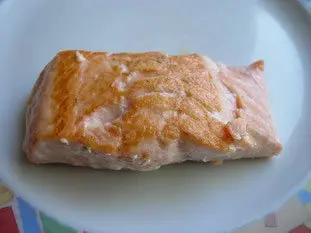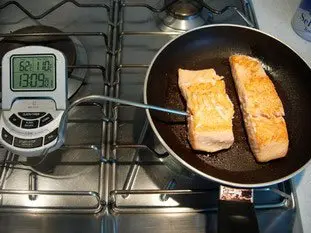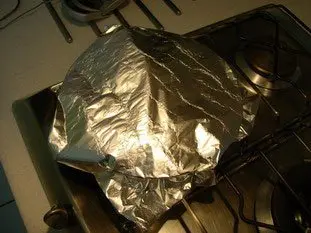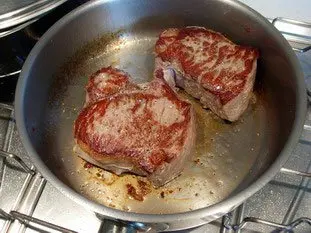This site uses only a few technical cookies necessary for its operation. By continuing to browse, you accept their use.
To find out more...
To find out more...
The secret of cooking until "done"

This is a real chef's skill: being able to look at a fish fillet cooking and say, "Stop – that's enough, it's cooked". I always admire this ability to see at a glance if something is done. It is what sets the professionals apart from us mere amateurs.
And it's true that how fish is cooked is important. If it is underdone, it can be sticky and tasteless, overdone and it dries out and becomes rubbery.
And it's true that how fish is cooked is important. If it is underdone, it can be sticky and tasteless, overdone and it dries out and becomes rubbery.
21 K 4.4/5 (25 reviews)
Keywords for this post:CookingChefJustTimeFishMeatMeasureThermometerLast modified on: November 26th 2012
The secret of cooking until "done"
Here we have a problem: the chef's eye (so they say) is only acquired after many years of experience, so it's unlikely that you or I will ever have it! So are our eyes only good for shedding a regretful tear? No – we can dry our eyes and let technology come to the rescue: for food to be cooked just right is simply a matter of temperature. In other words, fish will be perfectly cooked when the temperature in the centre of the fillet reaches 65-70°C (149-158°F).
Here's the trick: first cook the fish on one side (salted and peppered beforehand). When it looks sufficiently fried or grilled, turn it over and stick an electronic thermometer into the centre.
As soon as the temperature shown reaches 65°C (149°F), remove the fish from the heat, transfer onto a hot plate and cover with aluminium foil. If you leave the thermometer in, you will see that even away from the heat source, the temperature will continue to rise by a few more degrees until it reaches around 70°C (158°F), so the fish will still be cooking.
This resting time also allows the juices which have flowed towards the outside to be reabsorbed into the flesh, giving you the tenderest and tastiest fish ever!
You may well be surprised at just how little time it takes to reach this temperature. You will no doubt find that you tended to overcook fish before.
2 observations:
- Certain electronic thermometers are fitted with an alarm which beeps at the chosen temperature, which is very useful.
- You will no doubt see other temperatures, less than 65°C, stated elsewhere. This is a matter of taste.
Chefs – yes, them again – use touch to judge how cooked red meat is.
This is not easy for the amateur but, fortunately for us, help is at hand! You can use the same method for red meat, but this time the temperature to watch for depends on how well done you like it:
52°C (126°F) = very rare (“bleu” = “blue” in French)
60°C (140°F) = rare
65°C (149°F) = medium
70°C (158°F) = well done
But these temperatures are very approximate, as for red meat, you need to establish your own scale, according to your own taste.
Measure
Here's the trick: first cook the fish on one side (salted and peppered beforehand). When it looks sufficiently fried or grilled, turn it over and stick an electronic thermometer into the centre.

Leave to rest
As soon as the temperature shown reaches 65°C (149°F), remove the fish from the heat, transfer onto a hot plate and cover with aluminium foil. If you leave the thermometer in, you will see that even away from the heat source, the temperature will continue to rise by a few more degrees until it reaches around 70°C (158°F), so the fish will still be cooking.

This resting time also allows the juices which have flowed towards the outside to be reabsorbed into the flesh, giving you the tenderest and tastiest fish ever!
You may well be surprised at just how little time it takes to reach this temperature. You will no doubt find that you tended to overcook fish before.
2 observations:
- Certain electronic thermometers are fitted with an alarm which beeps at the chosen temperature, which is very useful.
- You will no doubt see other temperatures, less than 65°C, stated elsewhere. This is a matter of taste.
What about meat?

Chefs – yes, them again – use touch to judge how cooked red meat is.
This is not easy for the amateur but, fortunately for us, help is at hand! You can use the same method for red meat, but this time the temperature to watch for depends on how well done you like it:
52°C (126°F) = very rare (“bleu” = “blue” in French)
60°C (140°F) = rare
65°C (149°F) = medium
70°C (158°F) = well done
But these temperatures are very approximate, as for red meat, you need to establish your own scale, according to your own taste.
Lasts posts
XO Cognac Explained: Meaning, Aging, and Flavor Profile
XO Cognac always goes beyond the labels on the bottle: it is often associated with tradition and quality. You get to appreciate the artistry, character and ageing process when you understand what defines this smooth Cognac. The section below tackles everything about XO Cognac, from complex flavour...January 28th 2026974 Sponsored article
Butter vs. grease
We often read in a recipe where a pastry is put into a mould that, just before pouring, the mould should be buttered or greased. But what's the difference between these 2 terms?December 1st 20252,6325
Getting out of the fridge early
Very often when you're cooking, you need to take food or preparations out of the fridge, to use them in the recipe in progress. There's nothing tricky about this: you just take them out of the fridge and use them, usually immediately, in the recipe. But is this really a good method?November 24th 20251,6965
Who's making the croissants?
When you look at a bakery from the outside, you naturally think that in the bakery, the bakers make the bread, and in the laboratory, the pastry chefs make the cakes. It's very often like that, with each of these professions having quite different ways of working, but sometimes there's also one...November 23th 20251,547
Oven height
When we put a dish or cake in the oven, we naturally tend to put it on the middle shelf, and that's what we usually do. But in some cases, this position and height can be a little tricky, so let's find out why.October 8th 20255,1775
Other pages you may also like
Stand mixer tools
Whether we call it a stand mixer, food processor, or simply refer to it by brand (Kenwood, KitchenAid, etc.), this machine is a valuable tool for amateur cooks, bakers or pastry chefs like ourselves. All these machines come supplied with 3 different tools. Let’s take a look at their names and...November 2nd 201938 K4.5
The "pith" of the cauliflower
When using cauliflower in a recipe, there is a lot of preparation work at the beginning: removing the leaves, taking the tops or florets, etc. It's a bit tedious, but in the end you're left with the best of the cauliflower, ready to be used in your recipe.February 5th 202214 K4.9
Tranché, dissociated, failed, in short... missed!
When preparing a sauce or a cream, there's always a (small) risk that the creamy preparation you're working on will suddenly separate into two parts of different textures: a liquid part, for example, and a more or less solid part, or even become lumpy. It's terribly frustrating, but we'll see...June 19th 202314 K5
Too much sweet and savoury
There is a food trend which is creeping in everywhere in France right now: mixing sweet with savoury. In some restaurants, it is becoming difficult to order a classic dish, like “roast veal” for instance, without being served fruits in the garnish or honey/conserves/syrup in the sauce or cooked...November 3rd 201128 K4.5
The art of the charlotte
In cooking, a charlotte is a delicious moulded dessert, with biscuits around the outside that have been soaked in a flavoured syrup, filled with a light cream or mousse. The charlotte is left to set in the fridge before being turned out and served in slices. It is very light and a lovely sweet...February 27th 201347 K4.3
Post a comment or question
Follow this page
If you are interested in this page, you can "follow" it, by entering your email address here. You will then receive a notification immediately each time the page is modified or a new comment is added. Please note that you will need to confirm this following.
Note: We'll never share your e-mail address with anyone else.
Alternatively: you can subscribe to the mailing list of cooling-ez.com , you will receive a e-mail for each new recipe published on the site.









